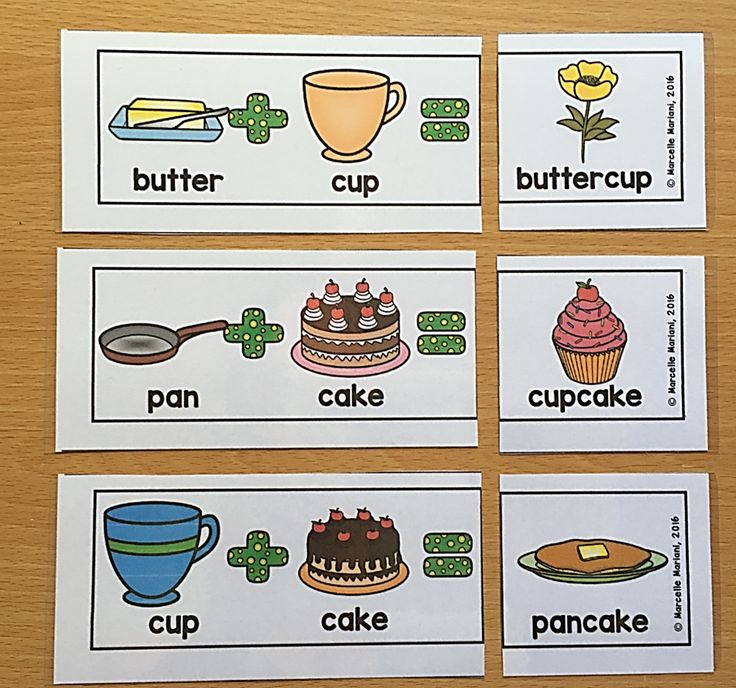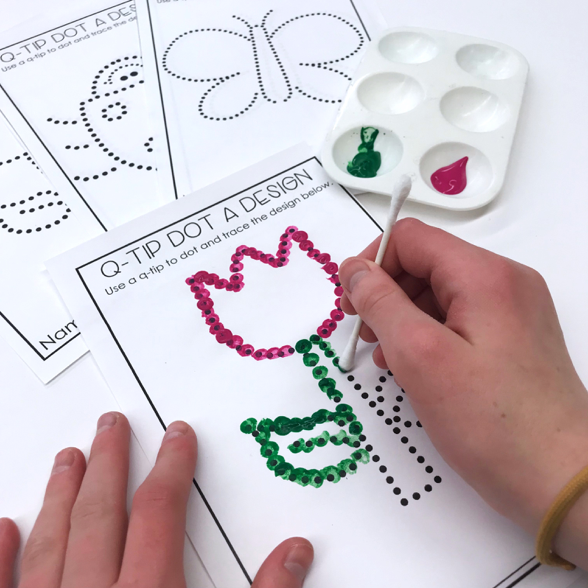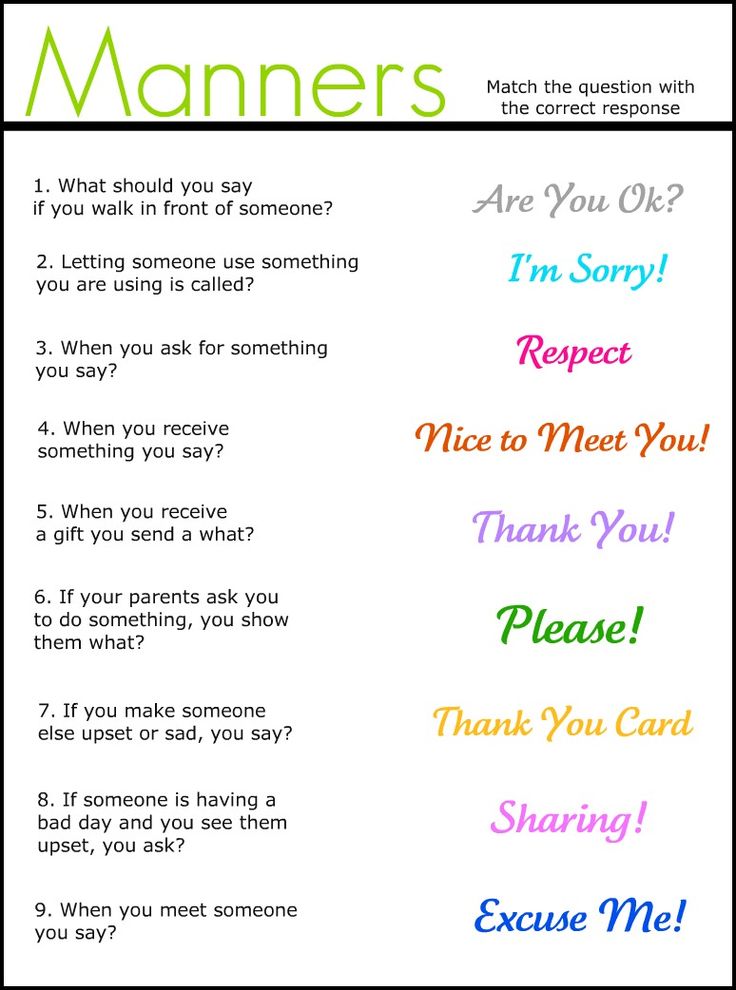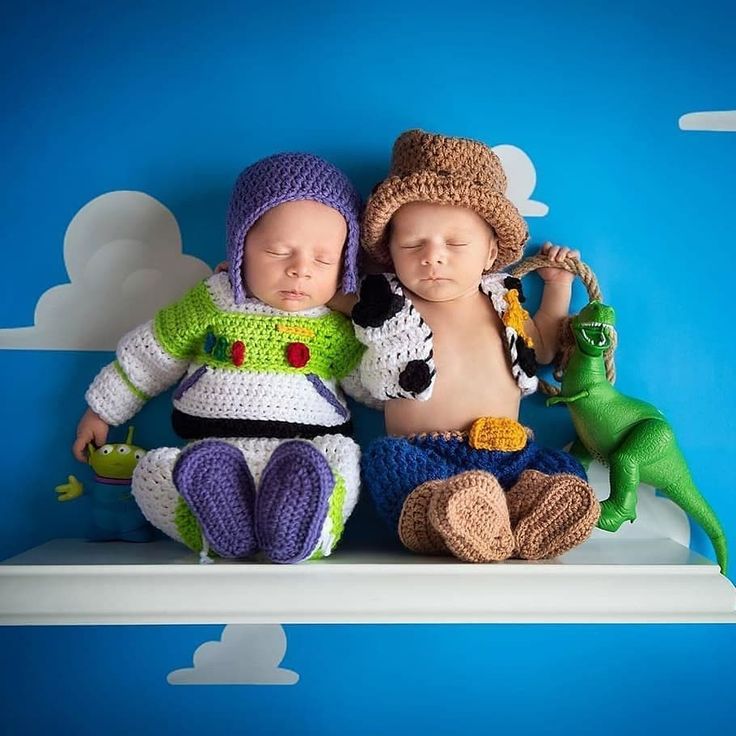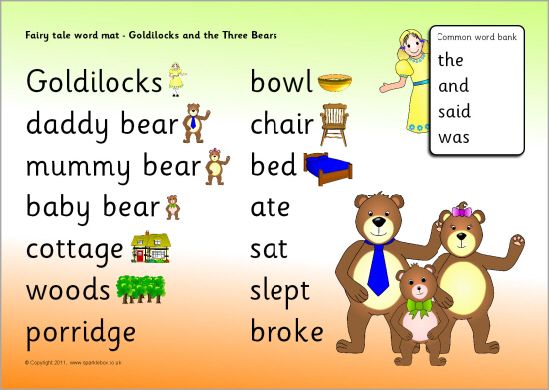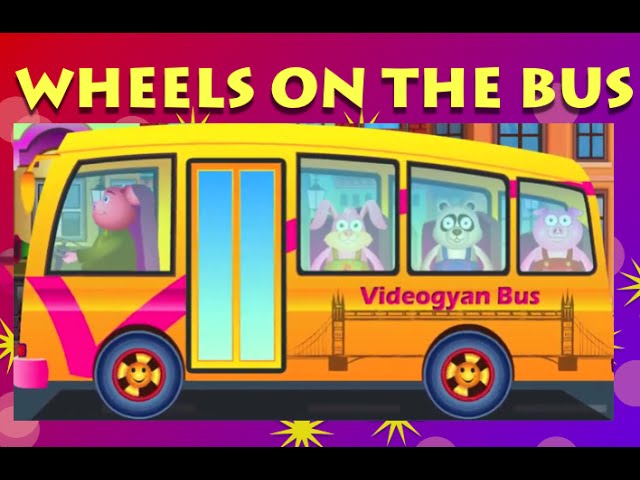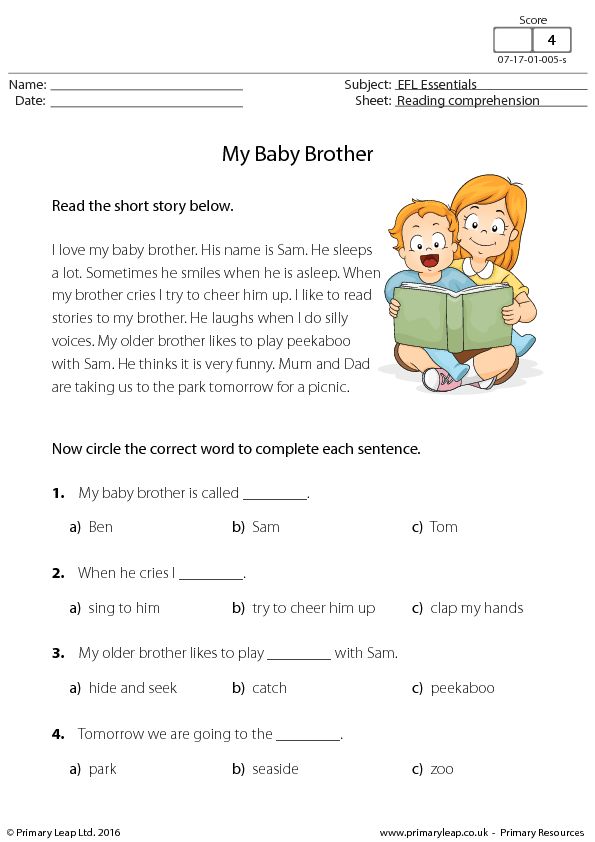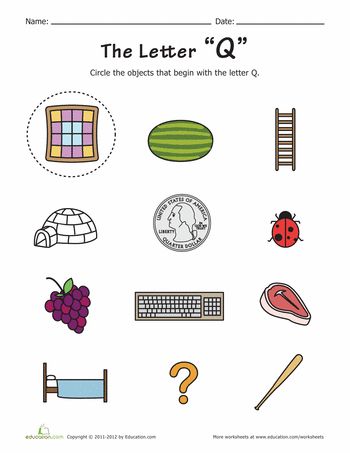Compound words for preschoolers
150+ Examples Of Compound Words For Kids
Compound words for kids are designed by combining two simpler words to form one complex word. An example of this would be mail + box = mailbox. We often use compound words without realizing they consist of two different, simpler words.
What are compound words?
When asking, “what are compound words?” we need to look at the utility of compound words in modern language. They describe complex ideas or objects that can be represented by combining two simpler words. For example, the words seashell and seashore are compound words that have derivatives in sea, shell, and shore.
We use compound words to make sense of new phrases, objects, phenomena, and events. They are highly flexible by design and can be used to describe a large number of things.
You can teach your students to use compound words through a compound words list for kids and compound words examples to get them to learn the construct effectively.
Let’s check out different types of compound words and some examples you can teach your students to help them understand compound words better for optimal reading. You can also use these examples of compound words to make stories and quiz your students in larger texts.
What are the types of compound words for kids?
Now that we have explored a comprehensive list of compound words for kids, let us understand what are the types of compound words that students should know and understand. You can focus on the utility of compound words to help students learn them better.
1. Closed compound words
This is a classic example of compound words, wherein two words come together to form a completely new type of word. An example of this would be, moon + light = moonlight or base + ball = baseball. You can focus on how these words are used extensively across literary works across reading levels.
2. Open compound words
When a modifying adjective is added to a noun to create a new noun, that is an open compound word. An example of this would be store + room = storeroom. You can focus on how open compound words are used when writing sentences and describing objects.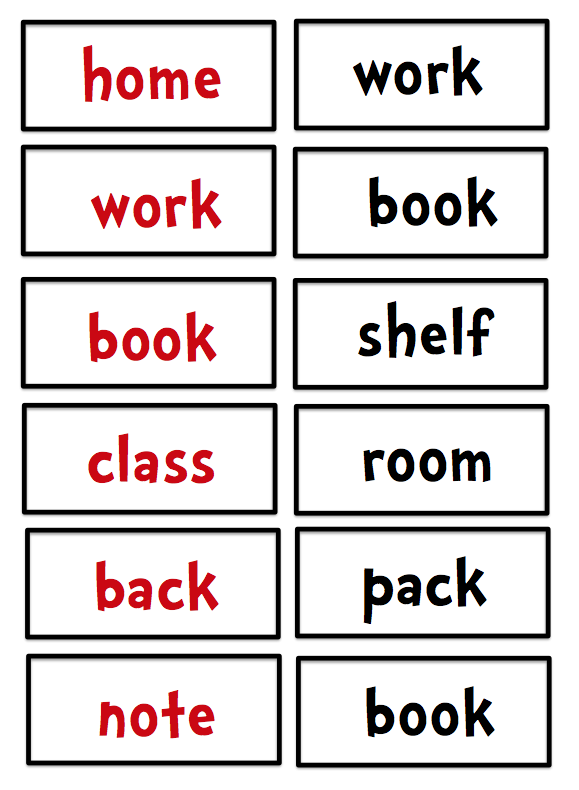
Words like father-in-law or well-known are hyphenated compound words as they are formed with a hyphen combining two words. They retain some of their original contextual meaning through hyphenation, giving readers clarity about their meaning.
By understanding the different types of compound words, you can teach your students to be better readers and writers in the English language. You can also focus on innovative teaching methods to better explain compound words to students. You can leverage unique strategies to make compound words intuitive for kids of all ages.
Let’s look at 150 examples of compound words for kids
Compound words come in all variations, making them an important topic to focus on as kids progress from grade to grade. You can use these 150 examples of compound words to teach kids about the subject area within your own lesson plan.
After + Noon = Afternoon
Air + Plane = Airplane
Air + Port = Airport
Angel + Fish = Angelfish
Any + Body = Anybody
Any + One = Anyone
Arm + Chair = Armchair
Arm + Pit = Armpit
Basket + Ball = Basketball
Bath + Tub = Bathtub
Bed + Room = Bedroom
Birth + Place = Birthplace
Blue + Berry = Blueberry
Body + Guard = Bodyguard
Book + Store = Bookstore
Brain + Storm = Brainstorm
Bull + Frog = Bullfrog
Bus + Boy = Busboy
Butter + Fly = Butterfly
Cab + Driver = Cabdriver
Can + Not = Cannot
Candle + Stick = Candlestick
Cat + Fish = Catfish
Cave + Man = Caveman
Cross + Bow = Crossbow
Cross + Walk = Crosswalk
Day + Break = Daybreak
Day + Dream = Daydream
Day + Light = Daylight
Desk + Top = Desktop
Dog + House = Doghouse
Door + Bell = Doorbell
Door + Mat = Doormat
Down + Hill = Downhill
Dragon + Fly = Dragonfly
Drop + Down = Dropdown
Dust + Bin = Dustbin
Every + Thing = Everything
Extra + Curricular = Extracurricular
Eye + Ball = Eyeball
Eye + Brow = Eyebrow
Finger + Nail = Fingernail
Fire + Cracker = Firecracker
Fish + Bowl = Fishbowl
Fisher + Man = Fisherman
Foot + Ball = Football
Foot + Path = Footpath
Foot + Step = Footstep
Gold + Fish = Goldfish
Good + Night = Goodnight
Grand + Father = Grandfather
Grass + Hopper = Grasshopper
Ground + Hog = Groundhog
Hard + Ship = Hardship
Head + Band = Headband
Home + Town = Hometown
Honey + Dew = Honeydew
Hop + Scotch = Hopscotch
Horse + Play = Horseplay
Hot + Dog = Hotdog
In + Side = Inside
It + Self = Itself
Key + Board = Keyboard
Lay + Out = Layout
Lay + Over = Layover
Life + Time = Lifetime
Light + House = Lighthouse
Lip + Stick = Lipstick
Mail + Box = Mailbox
Merry + Go + Round = Merry-Go-Round
Mid + Night = Midnight
Milk + Shake = Milkshake
Mind + Set = Mindset
Moon + Light = Moonlight
Mother + In + Law = Mother-In-Law
Mother + Land = Motherland
Name + Sake = Namesake
Neck + Tie = Necktie
Needle + Point = Needlepoint
New + Born = Newborn
News + Letter = Newsletter
News + Paper = Newspaper
Ninety + Nine = Ninety-Nine
No + Body = Nobody
Nose + Bleed = Nosebleed
Note + Book = Notebook
Note + Worthy = Noteworthy
Out + Side = Outside
Over + Estimate = Overestimate
Pepper + Mint = Peppermint
Pillow + Case = Pillowcase
Pony + Tail = Ponytail
Pop + Corn = Popcorn
Race + Horse = Racehorse
Rail + Road = Railroad
Rain + Bow = Rainbow
Rain + Coat = Raincoat
Rain + Storm = Rainstorm
Rain + Drop = Raindrop
Row + Boat = Rowboat
Run + Way = Runway
Safe + Guard = Safeguard
Safe + House = Safehouse
Salt + Water = Saltwater
Scare + Crow = Scarecrow
School + House = Schoolhouse
Short + Term = Short-Term
Show + Lace = Shoelace
Skate + Board = Skateboard
Smart + Phone = Smartphone
Snow + Storm = Snowstorm
Soft + Ball = Softball
Some + Where = Somewhere
Sound + Proof = Soundproof
Space + Ship = Spaceship
Spear + Mint = Spearmint
Stair + Case = Staircase
Star + Fish = Starfish
Star + Light = Starlight
Sting + Ray = Stingray
Straw + Berry = Strawberry
Sub + Way = Subway
Sun + Burn = Sunburn
Sun + Flower = Sunflower
Sun + Glasses = Sunglasses
Sun + Ray = Sunray
Sun + Roof = Sunroof
Sun + Shine = Sunshine
Super + Man = Superman
Super + Star = Superstar
Table + Spoon = Tablespoon
Tad + Pole = Tadpole
Tail + Bone = Tailbone
Take + Out = Takeout
Tea + Cup = Teacup
Tea + Spoon = Teaspoon
Text + Book = Textbook
Throw + Back = Throwback
Thunder + Storm = Thunderstorm
Tooth + Brush = Toothbrush
Tooth + Paste = Toothpaste
Tug + Boat = Tugboat
Tupper + Ware = Tupperware
Two + Fold = Two-fold
Under + Ground = Underground
Up + Stream = Upstream
Upper + Class + Man = Upperclassman
Waste + Basket = Wastebasket
Water + Body = Waterbody
Water + Melon = Watermelon
Water + Proof = Waterproof
Wheel + Chair = Wheelchair
With + Out = Without
Work + Boats = Workboats
Work + Sheet = Worksheet
You can also take advantage of the online games available through SplashLearn to teach through gamified learning.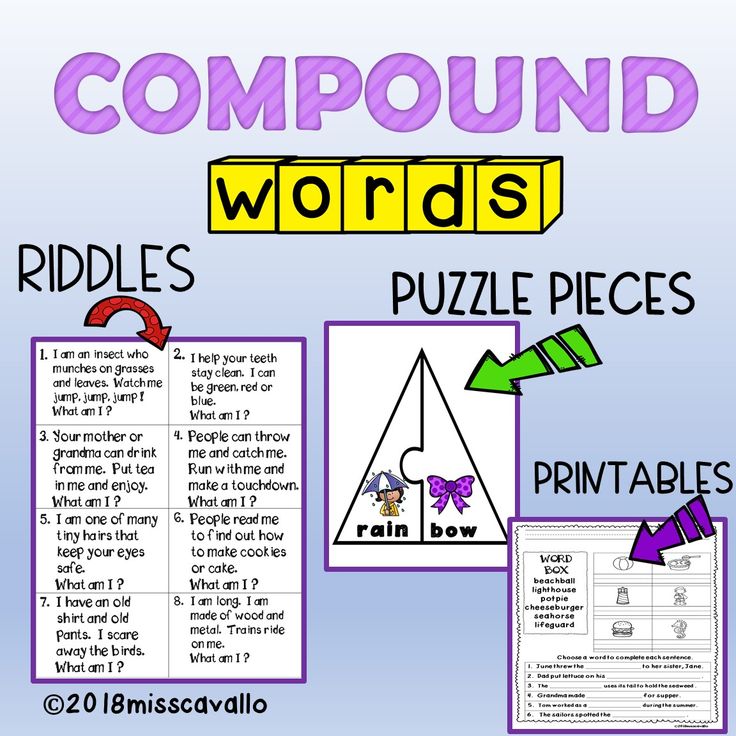
Check out our extensive library of amazing reading games you can play with your students!
Exploring fun ways of teaching compound words to kids
Teachers should look for two essential elements when explaining compound words to students; you should remember to explain that compound words can have new meanings when connecting two smaller words.
You should also clarify that complex words can be three words coming together to form a new word. Compound words can be multi-syllable, but not all multi-syllable words are compound words. This should help kids understand what they are without feeling confused.
Compound words for kids can be complicated to pick up through verbal instructions alone. You can focus on games, puzzles, toys, and exercises to get kids to understand the utility and versatility of compound words.
1. Identifying compound words in storiesBy reading through books and short stories, your students may already be familiar with, you can ask kids to identify compound words within the text.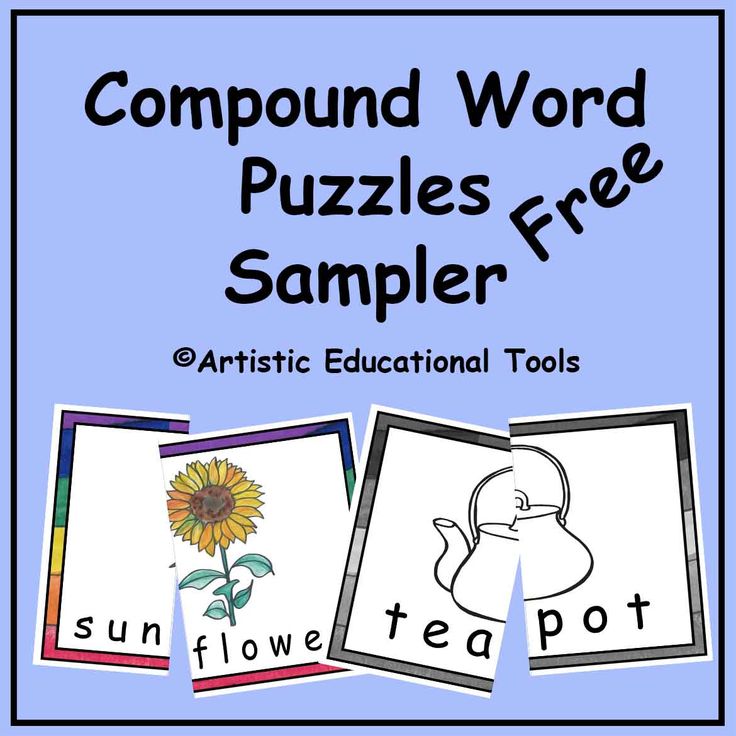 This will help them understand why we use compound words in English and how they impact contextualization and structuring.
This will help them understand why we use compound words in English and how they impact contextualization and structuring.
You can make poems and songs on compound words and use songs to help kids enjoy learning about compound words naturally. You can also bring props to demonstrate which words are compound words and which aren’t.
3. Chopping wordsYou can print out compound words on paper in a nice bold font and have your students cut in the middle of the compound word to create two words. If your students understand compound words correctly, they should be able to cut the compound word’s original root words.
4. Determining Which is Compound & Non-CompoundYou can play a game with your students to help them understand compound words better. By giving them two options and asking them to figure out whether they are compound words or not, you can test their abilities organically.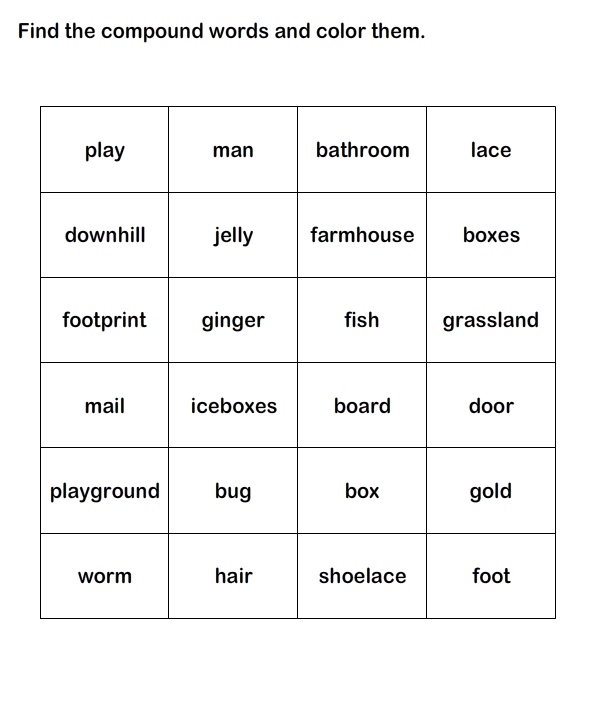 You can also provide references and compound word list examples.
You can also provide references and compound word list examples.
You can prepare a deck of single words printed onto cards and present them to your classroom. They need to match the correct pairs together to form a compound word. You can also do this activity with hyphenated words by giving them extra cards representing a dash.
6. Draw the compound wordThis gives your students a kinesthetic way of learning about compound words through painting. Your students can paint out the compound word based on the prompt shared with them. E.g., they can be given sun + screen, and they must draw a tube of sunscreen.
Related Reading: How Can Teachers Help English Language Learners
Frequently Asked Questions(FAQs)
Can you use flashcards to teach compound words ?
Yes, flashcards are an effective way to teach compound words to kids. You can print them out as a teaching tool when exploring complex compound words.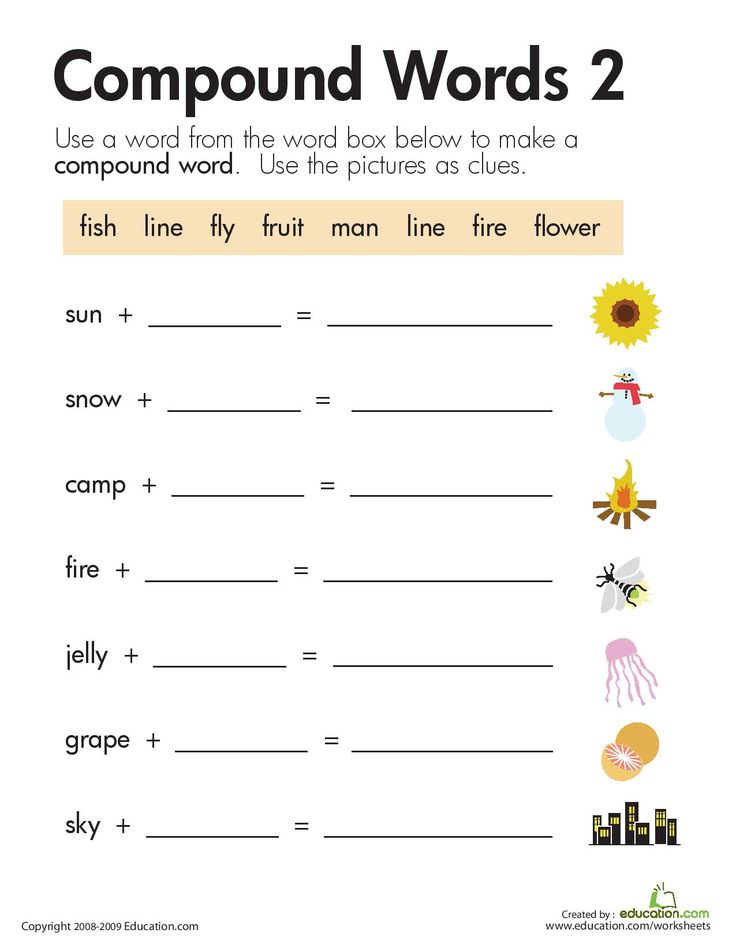
Why do kids need to learn compound words?
The etymology and utility of compound words are essential to teaching kids to make them more comfortable with speaking, understanding, writing, and listening to the English language.
How to introduce compound words to young kids?
You can introduce compound words to kids through multiple strategies, such as with toys, props, storytelling, and games.
Compound Words For Kids: Tips And Activities
What do you get when you put foot and ball together? Football! This is an example of a compound word, and as your child continues to build their vocabulary, it’s essential to introduce them to compound words for kids.
In this article, we’ll discuss how to form a compound word and how to help your child identify them in a sentence. We’ll also compare the different types and share some fun activities for your young learner to practice their new vocabulary skills.
What Is A Compound Word?
In the football example above, we combined two small words (foot + ball) to form a new one.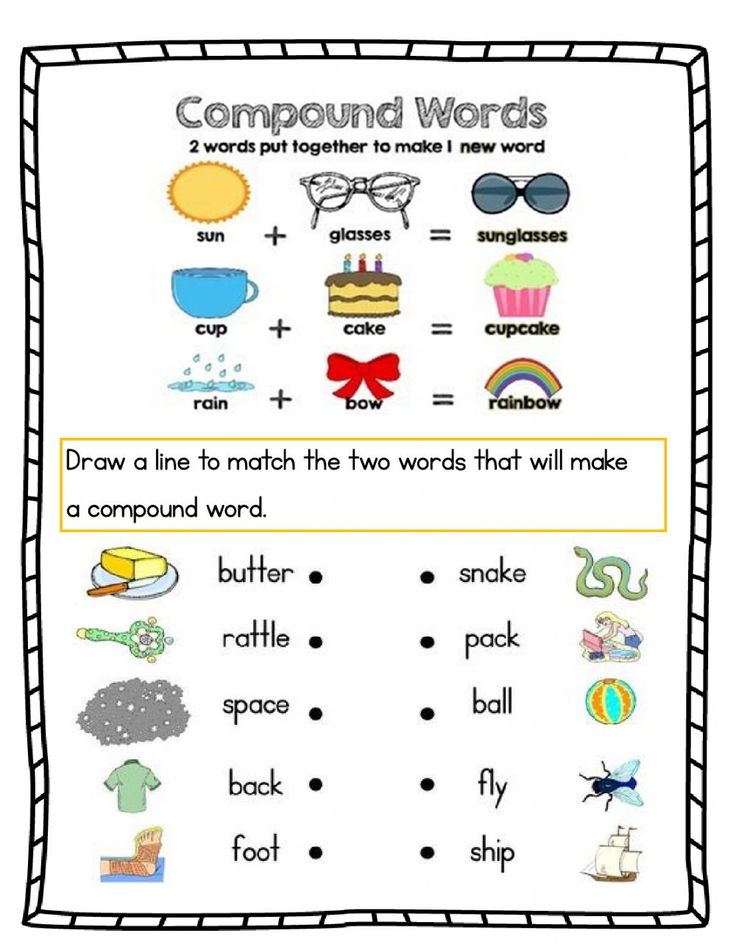 This is the essence of a compound word: a word formed by combing two smaller words.
This is the essence of a compound word: a word formed by combing two smaller words.
There are also compounds made of three words (for example: heretofore, nevertheless, highwaymen). But for now, it is best to stick to two-word compounds.
Why is it important to know how to appropriately form compound words? Well, combining words in a compound form creates an entirely different meaning than the meaning of the two original words.
For example, when you combine run (a pace) and way (direction), you get runway (an airplane landing strip or fashion walkway). This is an important distinction.
Identifying Compound Words
While compound words have multiple syllables, not all multi-syllable words are compound words.
The best way to check if a word is a compound word is to see if you can break it down into separate words. If you can, then it’s a compound word. If you can’t, then it’s not.
Let’s test this out using the words below:
- Doctor
- Family
- Moonwalk
Is doctor a compound word? Though this word has two syllables, it doesn’t qualify as a compound word because you can’t break it down into separate words.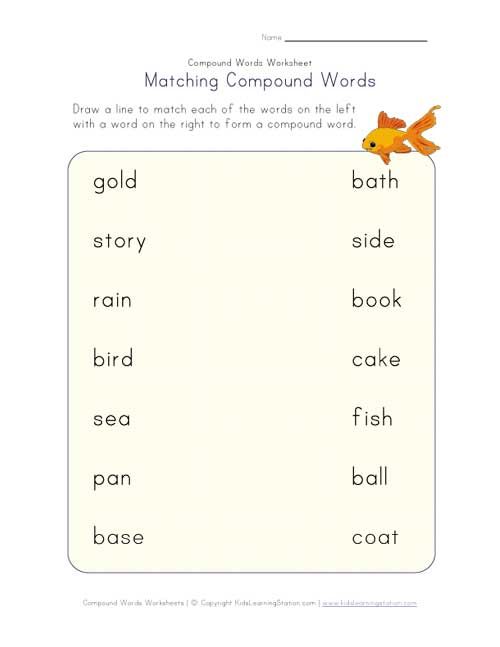
What about the word family? This word has three syllables. However, it can’t be categorized as a compound word because, just like doctor, it isn’t made up of separate words.
Is moonwalk a compound word? Moon + walk = moonwalk. So, yes! This is a compound word.
You can apply this test to any word to see if it meets the compound word requirements.
The 3 Types Of Compound Words
There are three different types of compound words: closed, open, and hyphenated.
- Closed compound words are created when two separate words form a single new word. For example, note + book = notebook.
- Open compound words are also created from two separate words. However, the words are still separated. For example, dining + room = dining room, or ice + cream = ice cream.
- As the name suggests, hyphenated compound words are connected by a hyphen. For example, long + term = long-term, or mother + in + law = mother-in-law.
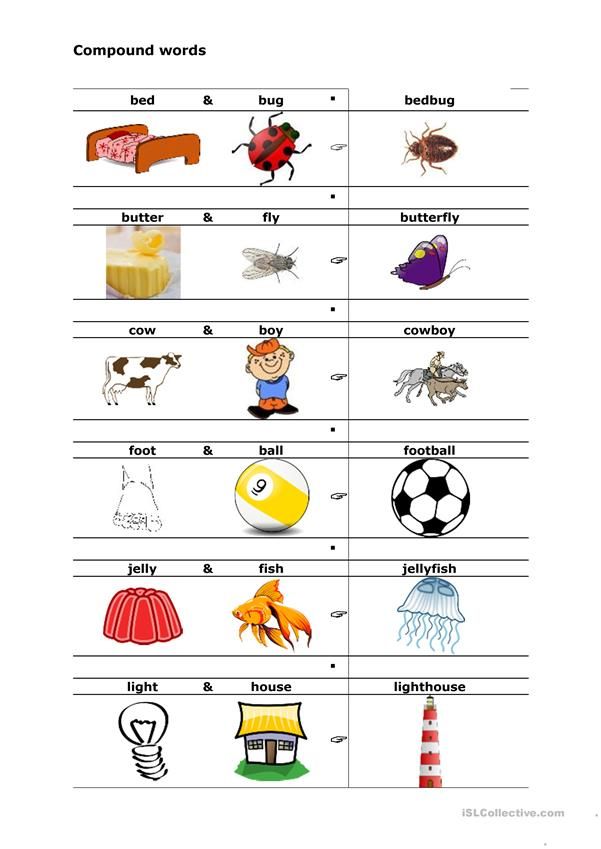
While this may seem like a lot to teach, don’t worry. There’s no need to explain the three different types to your child. At this stage of their learning journey, the focus will be on closed compound words only.
Compound Words For Kids
There are hundreds of compound words for kids to learn. Here are a few to help you get started:
- Fire + Fighter = Firefighter
- Super + Hero = Superhero
- Snow + Ball = Snowball
- Note + Book = Notebook
- Rail + Road = Railroad
- Under + Ground = Underground
- In + Side = Inside
- Mail + Box = Mailbox
- Break + Fast = Breakfast
- Sun + Flower = Sunflower
- Tooth + Brush = Toothbrush
- Rain + Coat = Raincoat
- Lip + Stick = Lipstick
- Cat + Fish = Catfish
- Bird + House = Birdhouse
- Arm + Pit = Armpit
- Work + Sheet = Worksheet
- Stair + Case = Staircase
- Some + Where = Somewhere
- Butter + Fly = Butterfly
- Sun + Glasses = Sunglasses
- Grand + Parents = Grandparents
- Text + Book = Textbook
- Cup + Cake = Cupcake
- Day + Dream = Daydream
- Book + Case = Bookcase
Activities That Teach Compound Words For Kids
1) Reverse The Word Order
What You’ll Need:
- Index cards
- Markers
- A list of reversible compound words
What To Do:
To get started, write one half of your compound word on a single index card and the other half on another.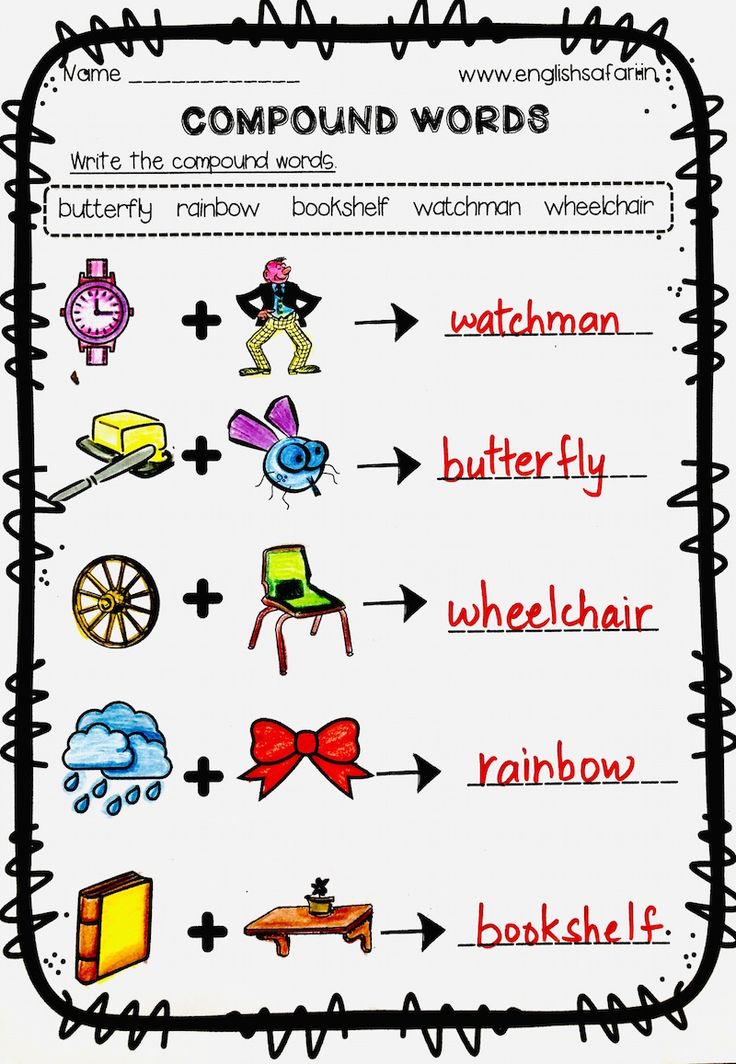 This means that each word will have two separate cards.
This means that each word will have two separate cards.
As the name suggests, this game requires reversible compound words. For instance, sleepover — oversleep.
If you can’t think of any right now, here’s a list to get you started:
- Sleepover
- Lookout
- Breakout
After writing the compound word parts on your two index cards, help your child read them out loud and take time to explain any word they may not understand. Then, lay the cards down, facing up.
The goal of Reverse The Word Order is simple: Reverse the order of the compound word.
Have your child look at the two parts of the reversible compound word that you laid down and read the cards together. Then, have them move the first card to the other side to make the second compound word and read it out loud.
If your child has trouble reading the words, don’t worry; they can still play! Simply read the words for them or help your child read them, and then continue as instructed above.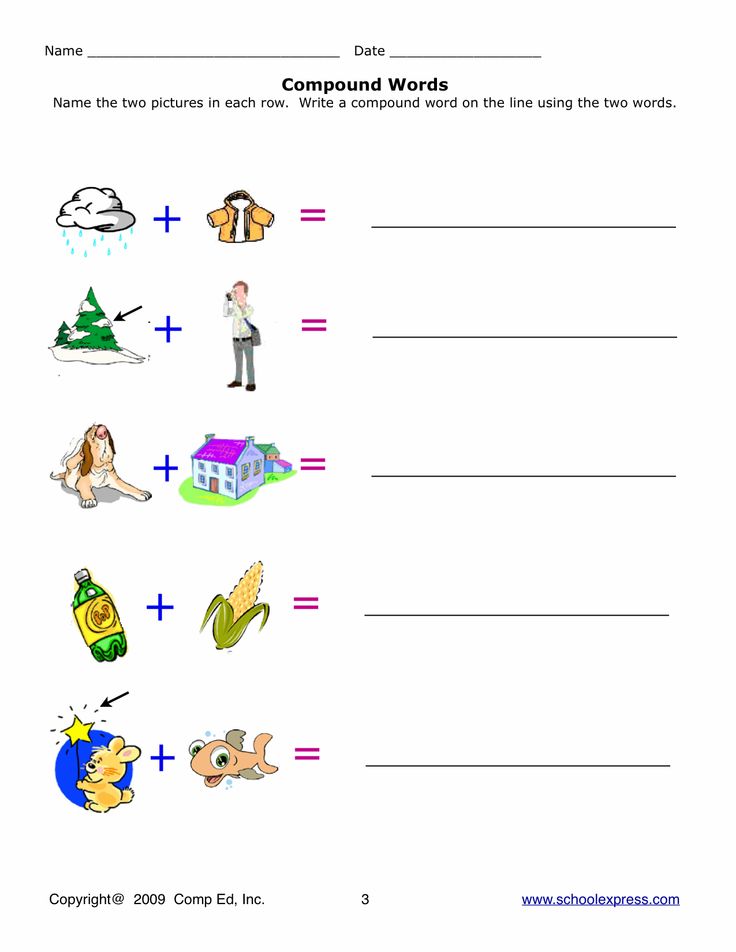
As a simpler alternative, you can also say a compound word backward and have your child try to say it forward. For example, if you say, “What is corn pop?”, they would answer, “Popcorn.”
This shows your child that each of these compound words can change into new words with entirely different meanings, depending on the order.
Completing this exercise will help your child understand the importance of word order in a compound word. For example, breakout and outbreak have completely different meanings, even though they are made up of the same letters and words.
As a simpler alternative, Say a compound word backwards and your child tries to say it forwards. What is corn pop? popcorn. What is boat life? Life boat.
This is also a great phonological awareness game. Phonological awareness refers to the skills a child needs to use while reading. In essence, it is understanding sounds in our language and how they relate to each other.
Phonological awareness plays a major role in early childhood literacy, and this game can help your child develop this important skill.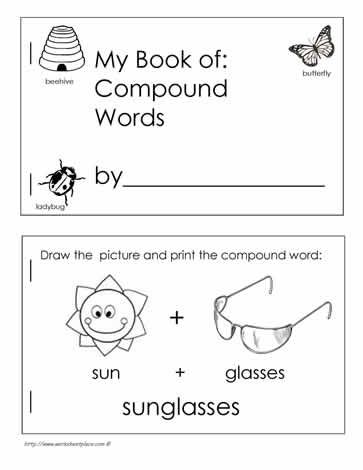
2) Image/ Word Match
What You’ll Need:
- Index cards
- Marker
- A list of compound words (you can use any of the words from the above “Compound Words For Kids” list)
- Pencil
What To Do:
With your child, write and draw the list of compound words on separate index cards. Write one half of the word in text and draw the other half as an image. For example, from the word pancake, one index card will have pan written out, and the other will have a drawing of a cake.
Next, lay your cards facing down (grid style).
To play, you and your child will take turns flipping two cards over at a time. (Think of the game Memory.) The goal is to find one card with a picture and another with a word to create a compound word.
When it’s your turn, if you find two cards that make up a compound word, you earn a point. If you don’t, you’ll have to wait for your next turn to try again. After 10 turns each, the player with the most points wins.
This game helps children develop segmentation skills. It also reinforces the concept that compound words are made from two separate words joined together.
For example, they may learn that the same cake from pancake can also form cupcake, cheesecake, etc.
3) Draw The Compound Word
What You’ll Need:
- Sheet of paper
- Index cards
- Marker
- Pencil
- Crayons
- A list of compound words (you can use any of the words from the above “Compound Words For Kids” list)
What To Do:
Sometimes, just understanding that a compound word is made up of two separate words can be hard to grasp for kids. This activity helps you demonstrate the concept in a fun and creative way.
Start by giving your child five compound words, and have them write the words down on a sheet of paper (with your help if needed). At this stage, your child will view the words as a whole.
Next, help your child separate the compound words by asking them to draw something that represents the two words that make up the compound word on each index card.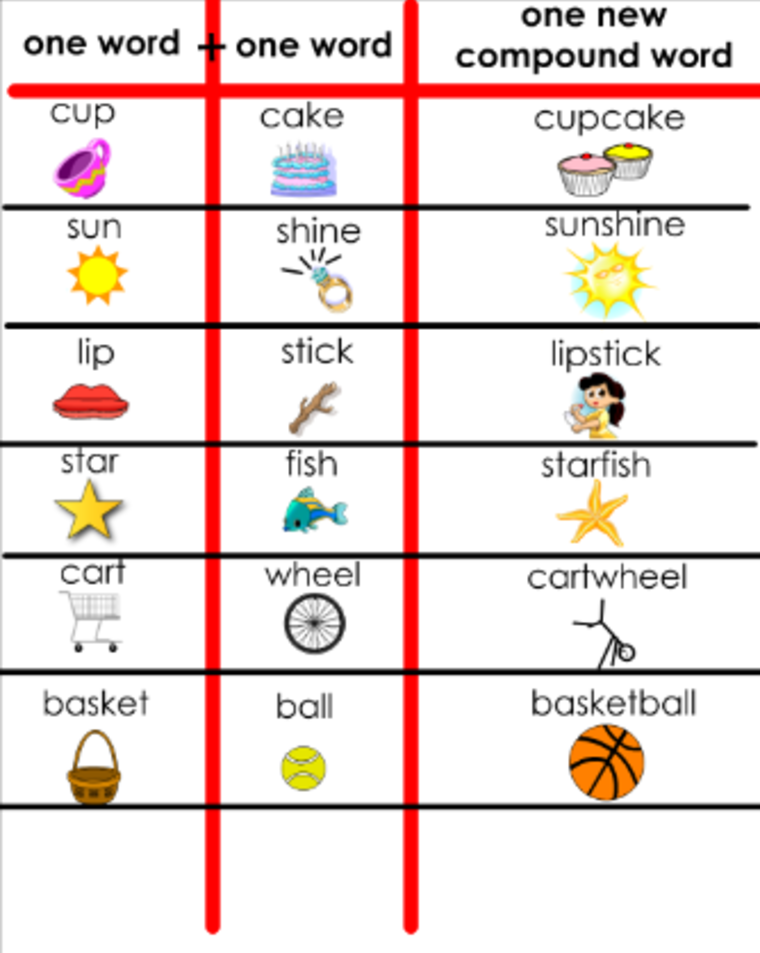
For example, from the word fireman, your child can draw one image of a fire and another of a man.
This isn’t a drawing competition, so don’t pay too much attention to how the images look. Instead, focus more on your child’s understanding of the separate words that make up the compound words.
4) Compound Word Creation
What You’ll Need:
- Index cards
- Marker
- A list of 5 compound words
What To Do:
Start by separating compound words into their two smaller words, and then have your child write each word on a separate card. While they are writing, encourage them to read the words out loud for practice.
Here’s a list of compound words you can use for this game:
- Goldfish
- Bookworm
- Superstar
- Rainbow
- Pancake
- Popcorn
- Butterfly
- Jellybean
- Moonlight
- Ladybug
After writing and reading the words, mix the cards up. Then, have your child pick two cards and make a brand new compound word.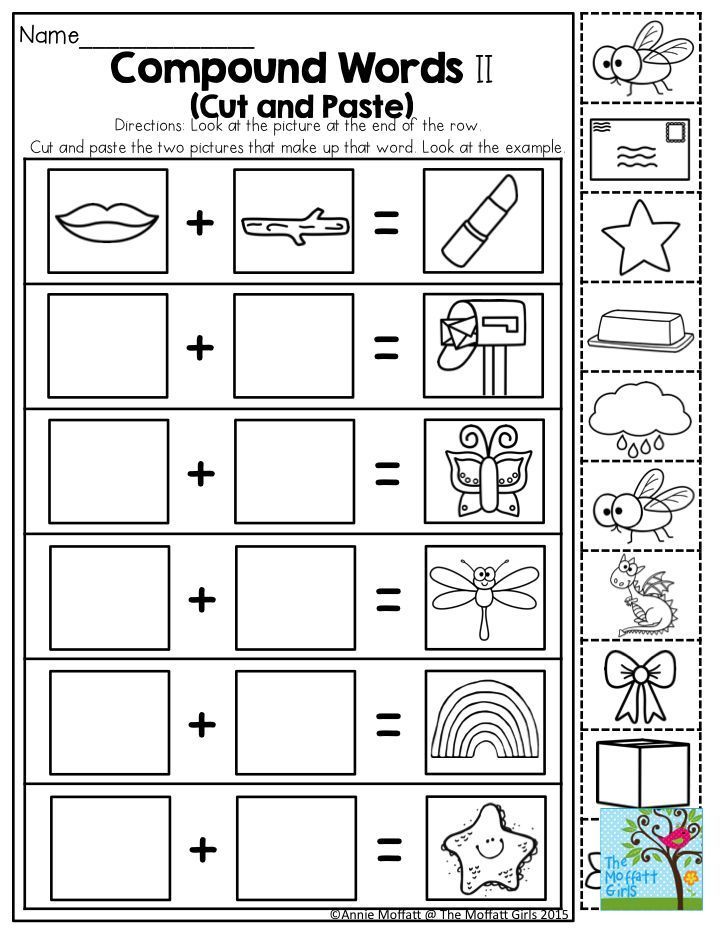 For example, from gold/fish, your child can create a new word — bookfish.
For example, from gold/fish, your child can create a new word — bookfish.
Note: The word doesn’t have to be “correct” — any two card combinations will do for this activity.
Let’s Make Some Compound Words!
Teaching compound words to kids is a great way to help them grow their vocabulary. If you’re working on this concept with your young learner, remember the fundamental rule: a compound word is made of two (or more) smaller words.
By using the activities above, you can help your child grasp compound words with ease!
Whether you decide to try out some or all of the games we recommend, be patient. Learning something new can take time, but with lots of practice, your child will eventually understand this new way to combine words!
Looking for even more ideas? Check out our Learn & Grow app for continued ways to support early childhood literacy.
Author
Speech therapy lesson for children 6-7 years old with OHP on the topic "Formation of compound words"
Synopsis speech therapy lesson on the formation lexical and grammatical representations on the topic: Formation of compound words.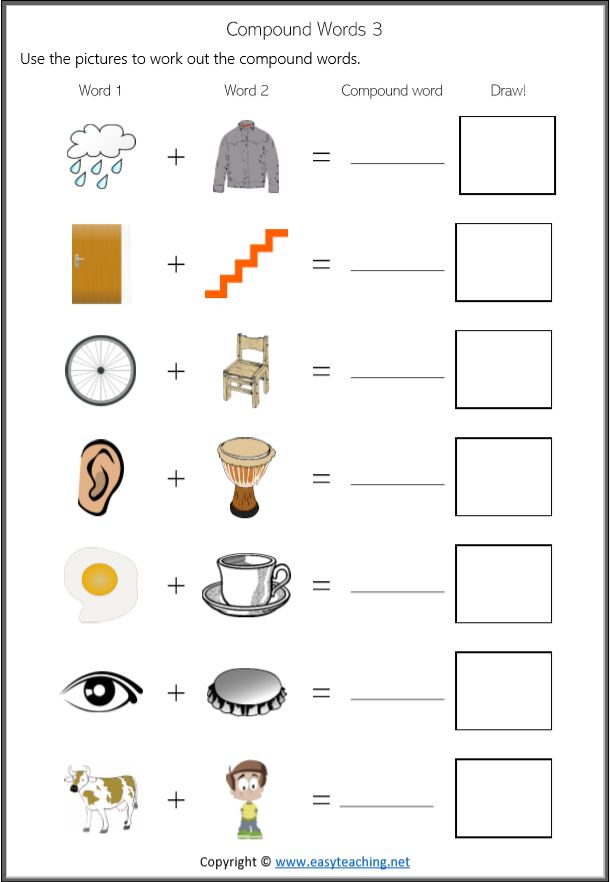
Thread : Education difficult words.
Group children according to the structure of speech disorders: ONR.
Priority educational activity: "Speech development". nine0005
Integration educational areas: "Speech development", "Cognitive development", "Social and communicative development", "Physical development".
Purpose : formation of compound words.
Tasks: correctional and educational: nine0004 learn to highlight by ear complex words from poems and tongue-twisters; develop skill recognize words by their interpretation; to form the skill of composing complex words by merging two bases; exercise in the independent formation of complex words with the help of supporting words; to consolidate the ability to divide complex words into two parts; enrich children's active vocabulary, learn to use complex words in speech; nine0003 correctional and developmental : development attention, memory, visual and auditory perception; development of speech coordination with movement; educational: nine0004 cultivate the ability to listen to each other's answers; educate cognitive interest in the native language.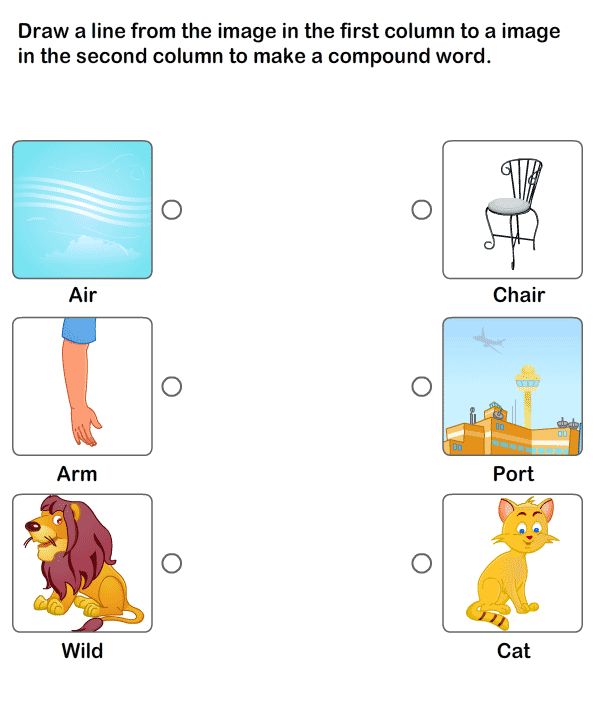
Planned results : children form (define) compound words and make sentences with them.
Vocabulary work: lumberjack, fisherman, birder, snake catcher, beekeeper, gardener, dog breeder, digger, chimney sweep, plumber, steamboat, lunar rover, ship, scooter, snowmobile, shrew, mousetrap, pedestrian, plane, locomotive, dump truck, milk truck, meat grinder, samovar, coffee maker, vacuum cleaner, leaf fall, waterfall, snowfall, ice drift, starfall, rhinoceros, water strider, centipede, tarantula, sweet tooth. nine0005
Equipment: semi-flower (paper), hoop, fishing rod with magnet, plastic animals in a bag, envelopes with pictures.
Demonstration picture material: leaf fall, waterfall, snowfall, ice drift, starfall, meat grinder, samovar, coffee maker, vacuum cleaner, rhinoceros.
Lesson plan
1. Organizational moment. Prove that spring came. Start your answer with the words “Spring has come because…” nine0005
2.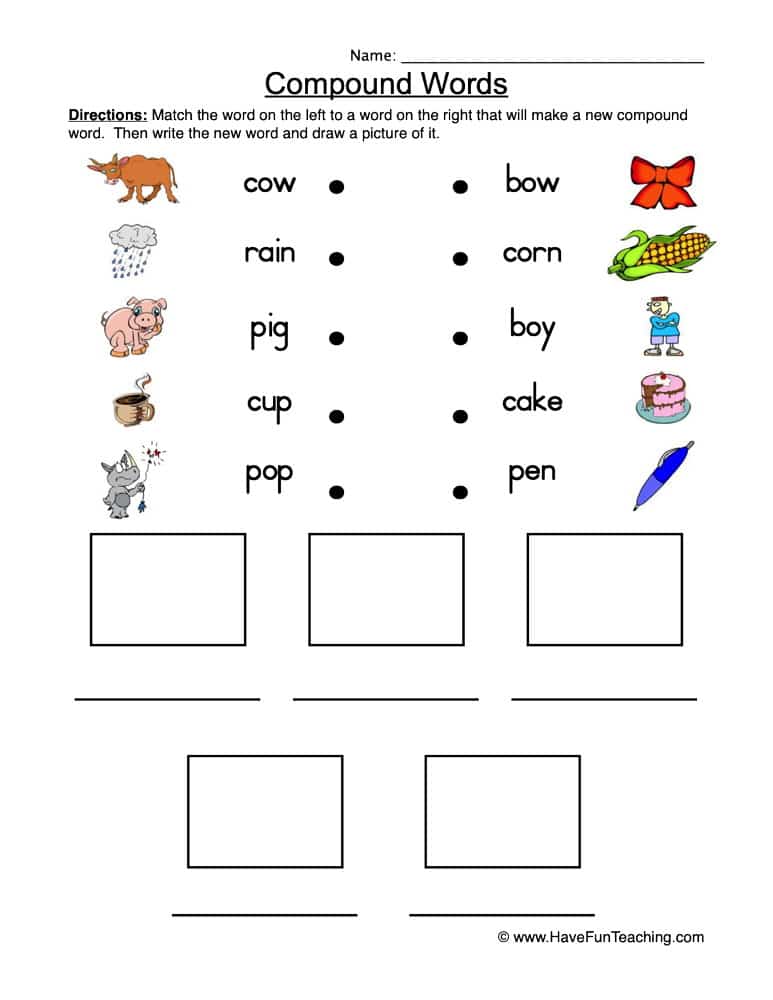 Introduction to the point.
Introduction to the point.
Game "Parts of a word". On chalkboard sheet with the image of an airplane, a scooter and a samovar (overlay of contours).
-What drawn in the picture? What is an airplane? The word plane consists of two parts (words): he flies. The words scooter and samovar are similarly understood.
- Today we will get acquainted with such complex words, which consist of two parts and learn how to put them together. And the seven-flower flower will help us. Why is the flower called "seven-flower"? (Children's answers)
- Tear off petal, give us a task, my friend (the child tears off the first petal, on which road shown).
3.Basic part. 1) Game "Road "
- One, two, three - turn around, on find yourself on the road!
On on the road you can meet cars whose names were formed from two words, for example: “milk”, “carries” - a milk carrier. Similarly we form the words: water carrier, timber carrier, fuel carrier, cement carrier, garbage carrier, flour carrier.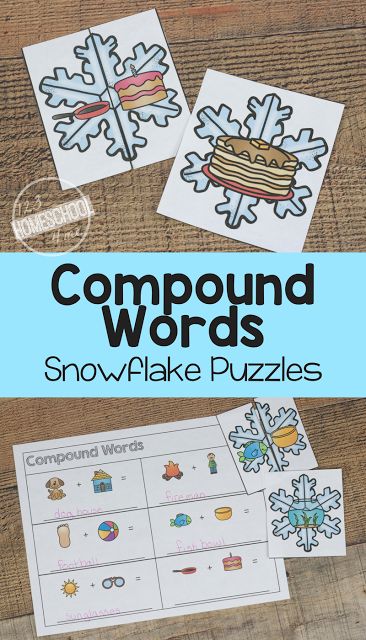 nine0005
nine0005
- Tear off petal, give us a task, my friend. (The child tears off the next petal with fishing rod)
2) Game "Fishing".
- One, two, three, turn around, on find yourself fishing!
B pictures lie on the hoop, children pull out one by one with the help of a fishing rod and call words, for example: a fisherman catches a fish (bird catcher, snake catcher, hunter, mousetrap, flycatcher). Education words using the verb "catch".
Tear off petal, give us a task, my friend. (The child tears off the next petal with ear)
3) The game "Find a difficult word."
- One, two, three, turn around, learn to listen carefully!
Listen and name difficult a word that is hidden in a poem or tongue twister .
It's snowing, cars are parked,
Even the tires don't rustle.
In our city today -
The snowiest, snowfall!
Del there is always a mass in the kitchen...
make minced meat?
here meat grinder: turn on the electricity -
You will receive minced meat the right amount!
lived on light dump truck,
He is on visited the construction site,
drove up in the morning to the gate,
Watchmen They asked: Who is there?
Water cascade is flying down!
This, my dear, is a waterfall!
This is the place where the water
Always hurries down.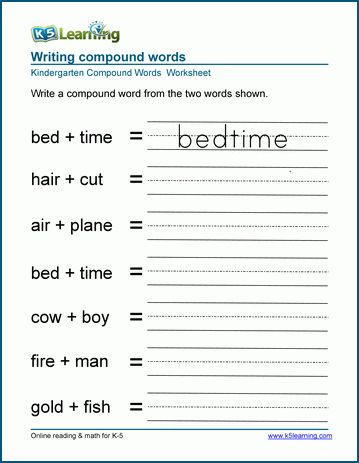
Aty-baty, the soldiers were walking Aty-baty, to the market, Aty-baty, what did you buy? Aty-baty, samovar. nine0005
Fish fisherman catches, The whole catch floated into the river.
Tear off petal, give us a task, my friend. (The child tears off the next petal with image of a man in a tracksuit)
4) Physical Minute
get charging!
Children perform movements after the teacher.
words there are miscellaneous: Hands on the belt. Turns left and right. funny, funny, simple and serious And very very complex. threaten with index finger of the right hand. nine0005
Falling leaves flying word. fluttering movements hands from top to bottom. Snowfall is a word brilliant. "Lanterns". Starfall is a sparkling word. Raising your hands up unclench your fist with force.
Waterfall - the word is wet. Shake off water drops hands. Ice drift - word floating. Wave-like movements palms. Rhinoceros - word mighty. bend hands to the shoulders, fingers clenched into a fist.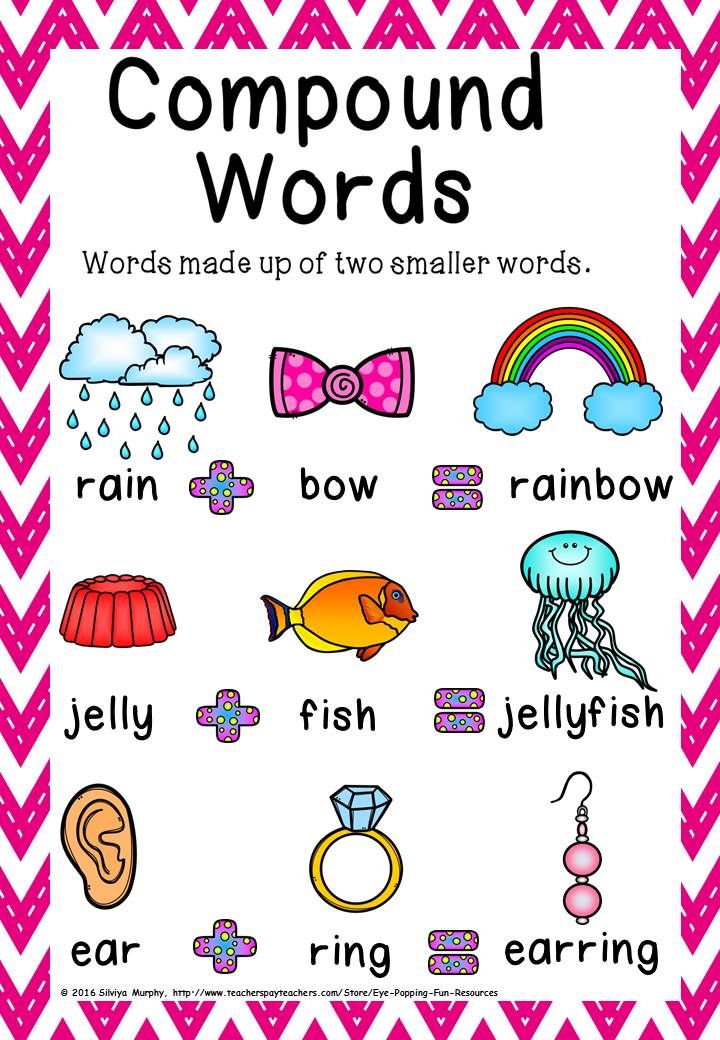 Vacuum cleaner - word buzzing. Imitation of a vacuum cleaner with sound: woo. Samovar - the word puffing. Spring, hands on the belt: puff-puff-puff. And sweet tooth is a word crispy! Snaps of the fingers: хр-хр-хр. nine0005
Vacuum cleaner - word buzzing. Imitation of a vacuum cleaner with sound: woo. Samovar - the word puffing. Spring, hands on the belt: puff-puff-puff. And sweet tooth is a word crispy! Snaps of the fingers: хр-хр-хр. nine0005
Tear off petal, give us a task, my friend. (The child tears off the next petal with zoo image)
5) Game "Zoo".
- One, two, three, turn around, in find yourself in the zoo!
Children take animals out of the bag and form complex adjectives.
U giraffe long neck (which giraffe?) long neck giraffe; the tiger is long tail-longtail tiger; at the zebra fast legs - swift-footed zebra, etc. nine0005
Tear off petal, give us a task, my friend. (The child tears off the next petal with Dunno)
6) Game "Explain Dunno".
- One, two, three, words Explain to a stranger!
K Dunno came to visit us (a picture is displayed). He knows a lot of complex words, but does not know how they turned out.
let's Let's explain the word "tricycle".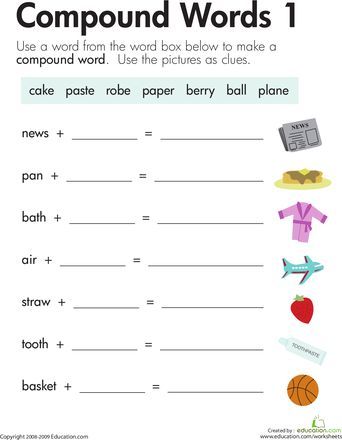 Children explain what words make up a compound word. What can be tricycle? Make up a sentence with this word. nine0005
Children explain what words make up a compound word. What can be tricycle? Make up a sentence with this word. nine0005
Similar work is carried out with the words: “five-story”, “centipede”.
From pick a petal, give us a task, my friend. (The child takes the next petal with the image of envelopes)
4.Independent application of knowledge in practice. Game "Envelope".
- One, two, three, in Kindergarten we will be back!
B envelope two pictures. You need to determine which picture has a compound word and make an offer with him.
5. Summary of the lesson. Guys, tell me, what words are called "complex"? (children's answers) What words did you remember?
Compound words visiting children
06 Mar 2011 Written by Ekaterina
For the development of the lexical and grammatical side of speech, I developed a lesson using technical means. Since the formation of complex words by adding two words for a preschooler is a very difficult task, I tried to facilitate this task with the help of visual-game tools, modeling situations.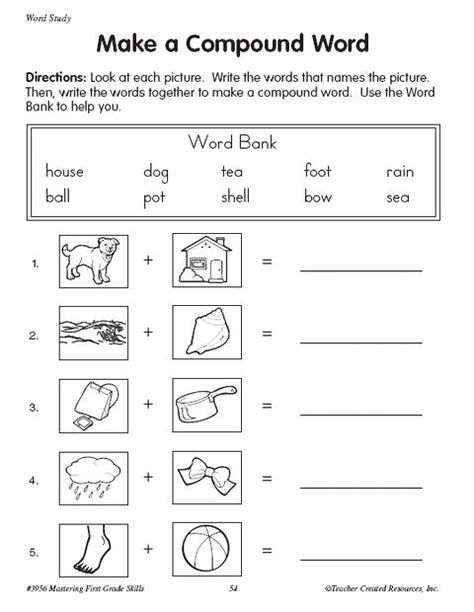 nine0199
nine0199
Speech therapist Zonova N.A.
MDOU d / s "Northern Lights".
p.
• Expand and consolidate ideas about the professions of people, their originality, attributes, abilities of a person
• Learn to form complex words by addition, activate the dictionary with complex words;
• Learn to form nouns from verbs;
Correction-developing:
• develop general and fine motor skills;
• improve the ability to use a long air jet;
• develop visual attention and perception;
• create an acoustic-articulatory sound image [Л']
• expand the dictionary with definitions, verbs;
• practice the ability to make sentences with a given word; nine0206 • development of graphomotor skills;
Correctional and educational:
• to cultivate the desire to engage in and achieve positive results.
• educate respect for the work of people of different professions
Equipment: TV, DVD player, music center, water and sand center, illustrations with people's professions, illustrations of the Cheburashka silhouette, a picture depicting a part of the Wolf's body, fishing rods, fish with magnets, a ball .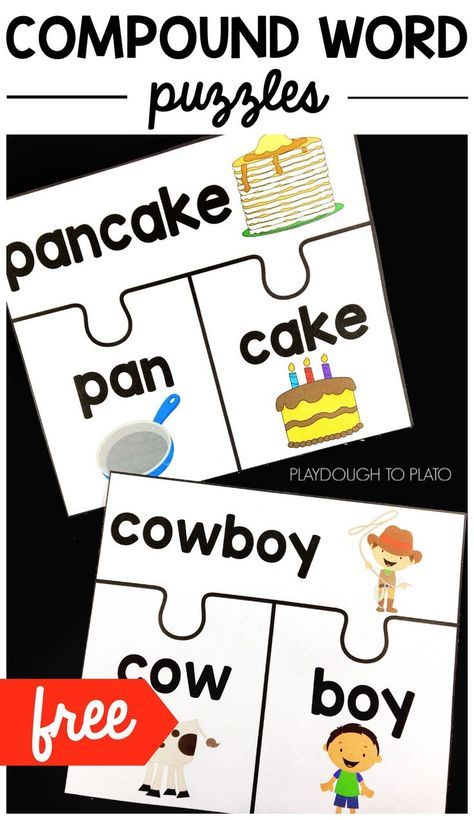
Handout: cards depicting various attributes for different professions, pictures depicting people of different professions, a simple pencil for each child didactic game "Sound Lotto", plastic massage balls, metal rings for each child; medals. nine0005
Preparing for the lesson: pre-filmed clip from the TV show “Good night kids”
1. Organizational moment:
Speech therapist:
One, two, three, four, five new day, I will smile at you, and you will smile at each other. We are calm and kind, we are friendly, healthy. Let's take a deep breath, inhale kindness and beauty.
The melody from the TV show “Good night, kids” sounds, the children sit down on the carpet in front of the TV. nine0206 Speech therapist: Why did the children's program start in the afternoon? Maybe we need our help, let's see.
2. Determination of motivation for the lesson:
A speech therapist appears on the screen in the role of a TV presenter and Phil's toy. They are having a dialogue.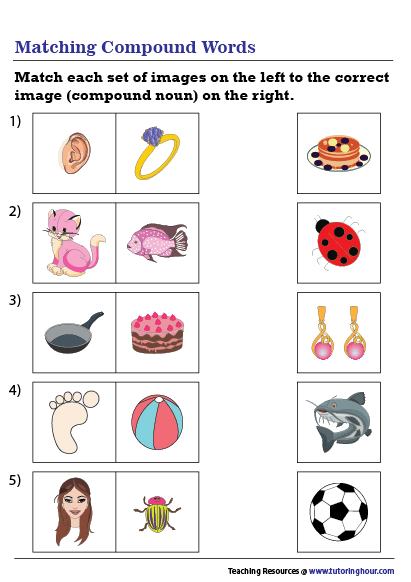 Filya turns to the children for help
Filya turns to the children for help
Filya: Hello, Natalia Aleksandrovna. I need help. I was given the task to unravel the professions of people by these attributes, but I just can’t do it, but I need to tell the children about different professions in the evening edition, I’m just “dying”, help. nine0206 Speech therapist: Okay, don't cry. Today I will have a lesson in the kindergarten "Teremok". The children in this garden are very smart, inquisitive and they will definitely help you. Let's start with my profession, TV presenter (shows two cards or a slide: on the first TV, on the second - the presenter) What does the TV presenter do? What attributes does he need?
Phil: microphone, script, news, audience.
Speech therapist: Right. The word "TV presenter" is derived from the two words television and leads. Here we have completed the first task. And now you, my dear children. nine0206 Turning off the TV
Speech therapist: today your favorite heroes of fairy tales and cartoons will ask us questions, which we will hear from the TV screen, they are TV presenters today.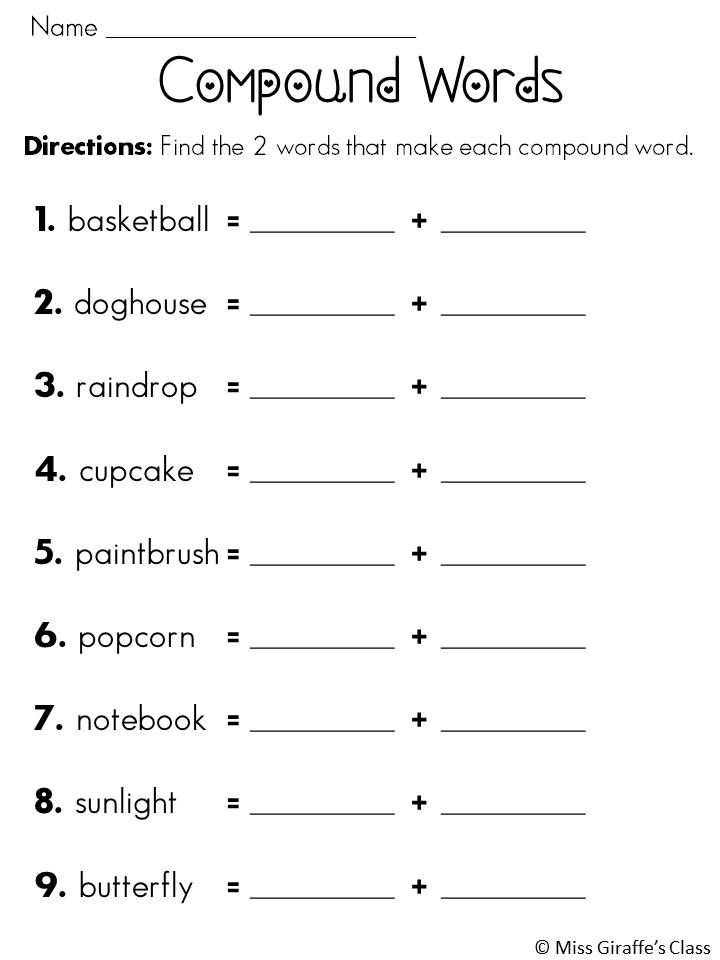 Who is the first, guess by the silhouette (the teacher shows the silhouette of Cheburashka)
Who is the first, guess by the silhouette (the teacher shows the silhouette of Cheburashka)
3. Development of general motor skills. Relaxation exercises:
Life-size puppet "Cheburashka" appears on the screen.
Cheburashka: Hello guys. Remember my movements, repeat them, and guess the profession of a person from these movements and these working tools. nine0206 Cheburashka imitates cleaning a pipe, climbing stairs, shaking off dust from clothes.
Speech therapist: Do you remember the movements? Let's repeat. (repeat movements)
Look at these tools, what profession does a person need them for? This profession is not very common in our time, it is a chimney sweep (shows cards or a slide: on one pipe, on the other - a person cleans)
Children: chimney sweep
Speech therapist: what does a chimney sweep do? What should be a chimney sweep? Why clean pipes?
Children: Cleans. Strong, brave, courageous. To be free from debris, dust, burning. To let the smoke out.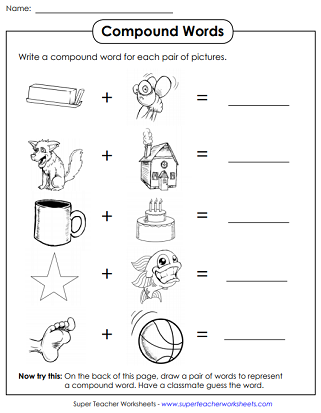 nine0005
nine0005
4. Self-massage of hands and fingers. Development of fine motor skills:
Speech therapist: guys, you said that the chimney sweep must be strong, then let's train our hands. To begin with, let's perform a massage with the help of plastic balls - "masseurs".
Children take balls and perform movements as shown by the teacher. The teacher accompanies the movements with a poetic text
Speech therapist:
We made a kolobok
From the flour of its side
Crumpled, crumpled, squeezed
We created a round ball
Rolled on the palm of your hand
We removed the other one
Tossed it up a little
And caught it by the sides
If you like it
Help yourself, I'll give it back
Next, exercises with metal rings are performed. The thumbs are worked out on both hands alternately
I put on the ring
Move it up and down
I roll, roll
I get great benefits
After self-massage, children are offered games to develop dexterity, accuracy, amplitude of the hands "Well", faster”, expanders, tops
Speech therapist pronounces a verse text on relaxation of the hands and fingers
Hands shook vigorously
our fingers stretched
yawned, yawned
and smiled at everyone.
5. Development of graphomotor skills:
Speech therapist: and now guys, come to your desks. Simple pencils and pictures are waiting for you. (each child names his picture from the attributes and tools of a chimney sweep)
Speech therapist: guys, you must shade your picture in the direction indicated in the box in the upper left corner of your leaflet (the teacher individually approaches and checks the correctness of the task, marks the landing when drawing) nine0005
6. Formation of a long targeted air jet:
Speech therapist: let's turn our attention to the TV screen, who is the next TV presenter? Try to get to know it in part. (showing part of the wolf picture)
A life-size puppet appears on the screen.
Wolf: Good afternoon, my friends. I enjoy being a TV presenter. Listen to my riddle, and quickly give me a guess:
Has wings, but does not fly
No legs, but you can’t catch up
Swims in an aquarium
Makes people happy
Children: Rybka
Wolf: Correct.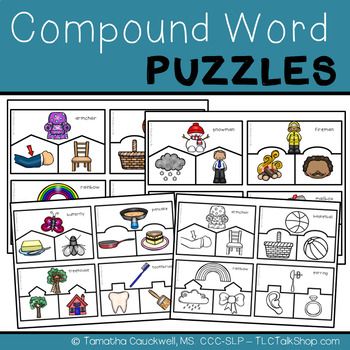 What is the name of the profession of a person who fishes?
What is the name of the profession of a person who fishes?
Children: fisherman.
Speech therapist shows two cards or a slide: on one - a fish, on the other - a person is catching
Speech therapist: What does a fisherman do? What kind of fisherman is he? What can you fish with?
Children: Catches fish. Strong, wet, bold. Fishing rod, nets, hands, harpoon.
Speech therapist: and now, you will be fishermen.
Children go to the center of water and sand and use fishing rods with magnets to catch fish. nine0206 Speech therapist: and I will ask some guys to blow, create a storm on our "sea", let our fishermen try to catch in difficult conditions.
Then the children switch roles.
Speech therapist: guys, look what we have at the bottom of the sea?
Children: rubbish, things, objects.
Children: diver
The teacher shows cards or a slide: on one - water, on the other - a person descends into the water
Speech therapist: What does the diver do? What kind of diver should be? Why do you need his profession? nine0005
7.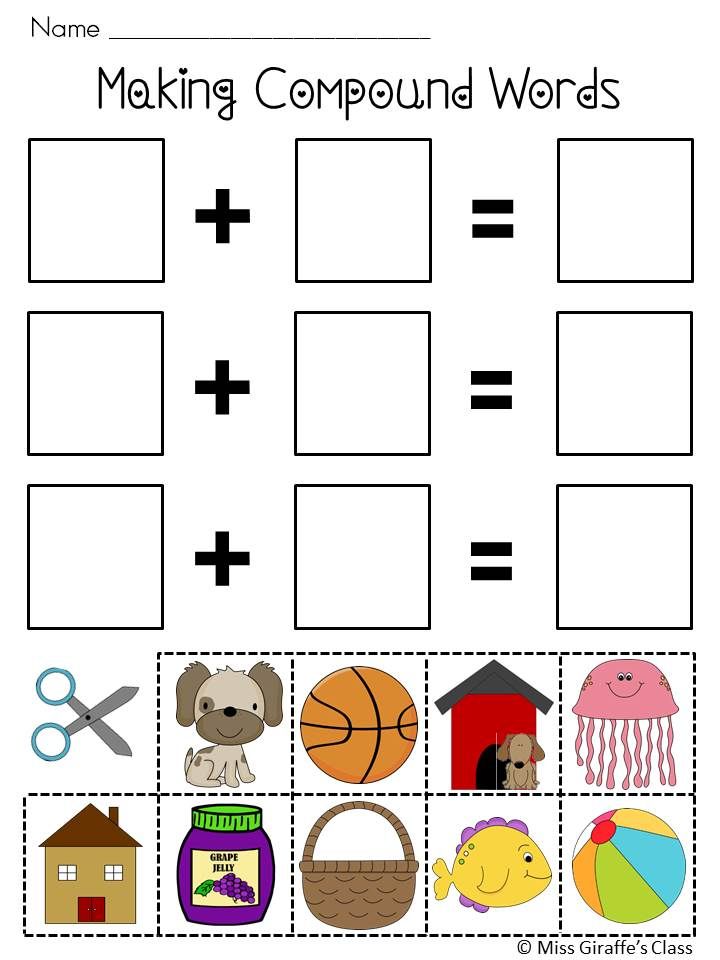 Formation of nouns from verbs:
Formation of nouns from verbs:
And now, stand in a circle, let's play the game "Who is doing what?" I will throw the ball to you and name the action, and you return the ball to me and name the profession of the person who performs this action
Teaches - teacher
Educates - educator
Cleans pipes - chimney sweep
Cooks - cook
Catches fish - angler
Flies - pilot
Climbs into the water - diver
Conducts television programs - TV presenter
8. Literacy education:
Speech therapist: We have another TV presenter, this is the heroine of many folk tales - the Fox.
Lisa's life-size puppet with his tasks appears on the TV screen.
Lisa: My dear children, I welcome you! I would like to understand who cuts down trees in our forest? If you recognize a person of this profession, tell him that there are few trees left in our forest. I hope for you.
Speech therapist: (shows cards or a slide: on one - a forest, on the other - an ax) Guys, what is the name of the profession of a person who cuts a forest? nine0206 Children: Lumberjack
Speech therapist: What does a lumberjack do? What tools does a lumberjack need? Is it possible to mindlessly cut down a forest? Guys, what is the first sound in the words "Lumberjack" and "Fox"
Children: sound [L ']
Speech therapist: And how does the sound sound in these words: hard or soft?
Children: Softly
Speech therapist: Guys, come to the tables, let's tell everything we know about the soft sound [L']
Children choose cards with symbols that match the characteristics of the soft consonant sound (barrier - tongue, air stream - warm , according to the participation of the vocal cords - voiced, according to the participation of the middle part of the back of the tongue - soft, the color of the chip is green, the visual image of the letter and its name)
Speech therapist: Well done guys, they coped with the characteristics of the sound, and Lisa gave us cards with the names of professions that will help the forest animals.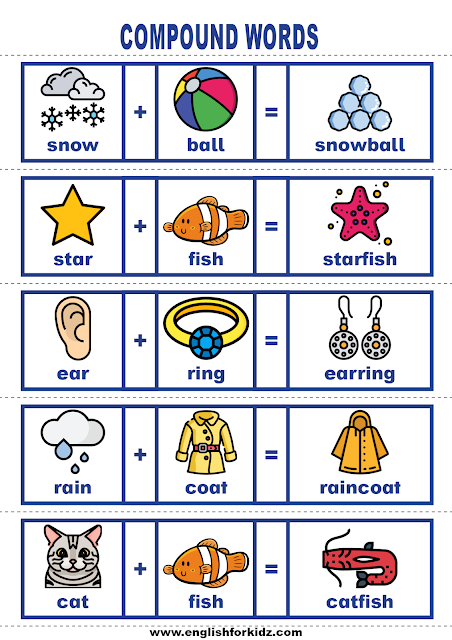 Let's try to guess them.
Let's try to guess them.
9. Consolidation of the ability to form complex words:
The teacher shows cards or a slide "Gardener", "Beekeeper"
Speech therapist: What does the gardener do? beekeeper? why do they plant gardens, bees?
Children: Plants gardens, breeds bees. Gardens are needed to be beautiful, to breathe easier, a home for birds and animals. Bees for pollination of flowers, for honey production. nine0005
10. To practice the ability to compose a sentence with a given word:
Speech therapist: Well, guys, you have learned a lot about different professions. Let's decompose the pictures depicting people of different professions into the necessary cards with the image of attributes.
Children independently lay out pictures depicting people of different professions on a card that shows the relevant attributes for this profession
Speech therapist: now guys, think and make a sentence with your word - the name of the profession, come up to me, pronounce your proposal.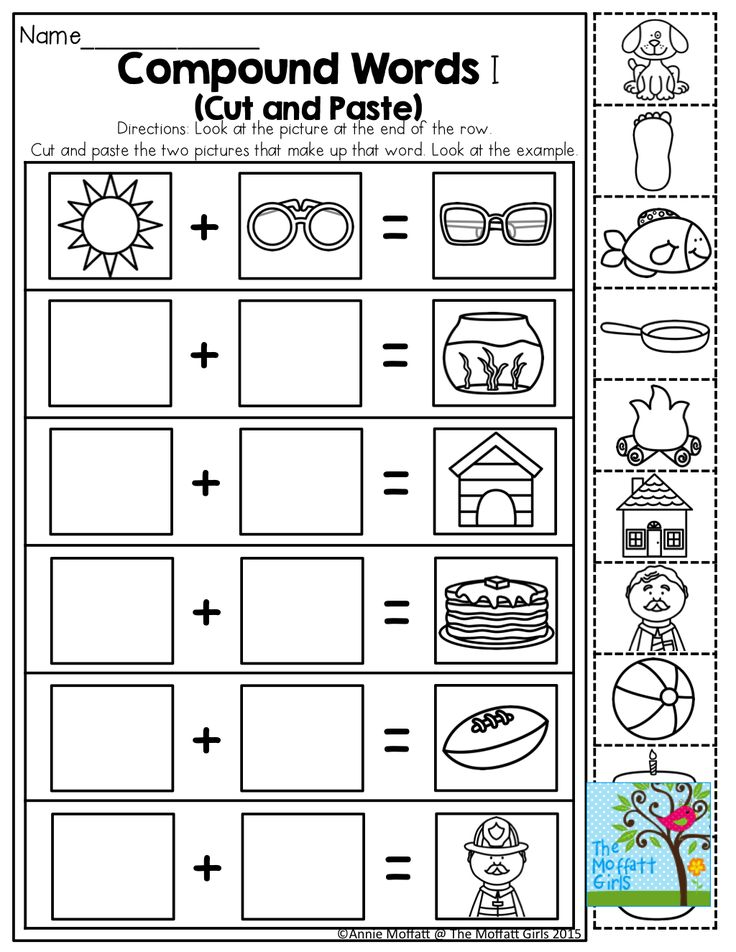 nine0206 I'll pass on your answers to Filla, and the show will be on time and very interesting.
nine0206 I'll pass on your answers to Filla, and the show will be on time and very interesting.
11. Summary of the lesson:
Children stand in a circle, the speech therapist asks questions and evaluates the work of the children in the lesson
Speech therapist: Guys, I really liked you, you clearly answered the questions, tried to pronounce the sounds correctly and clearly.
Which task did you like the most?
Which TV presenter was the best?
What is the profession you will choose when you grow up?
You greeted us with a smile
Answered questions
Draw and write
Play with fingers together
But the time has come to say goodbye
And I want to wish you,
To be proud of your profession, when you grow up
Be proud and work like today for a mark of five
The teacher awards each child with a medal
| Like | nine0390
Author: Ekaterina
Hello! My name is Ekaterina and I am glad to welcome you to the site " Speech Therapy for All " If you liked the materials of the site, then you can subscribe to new publications by RSS or Email.